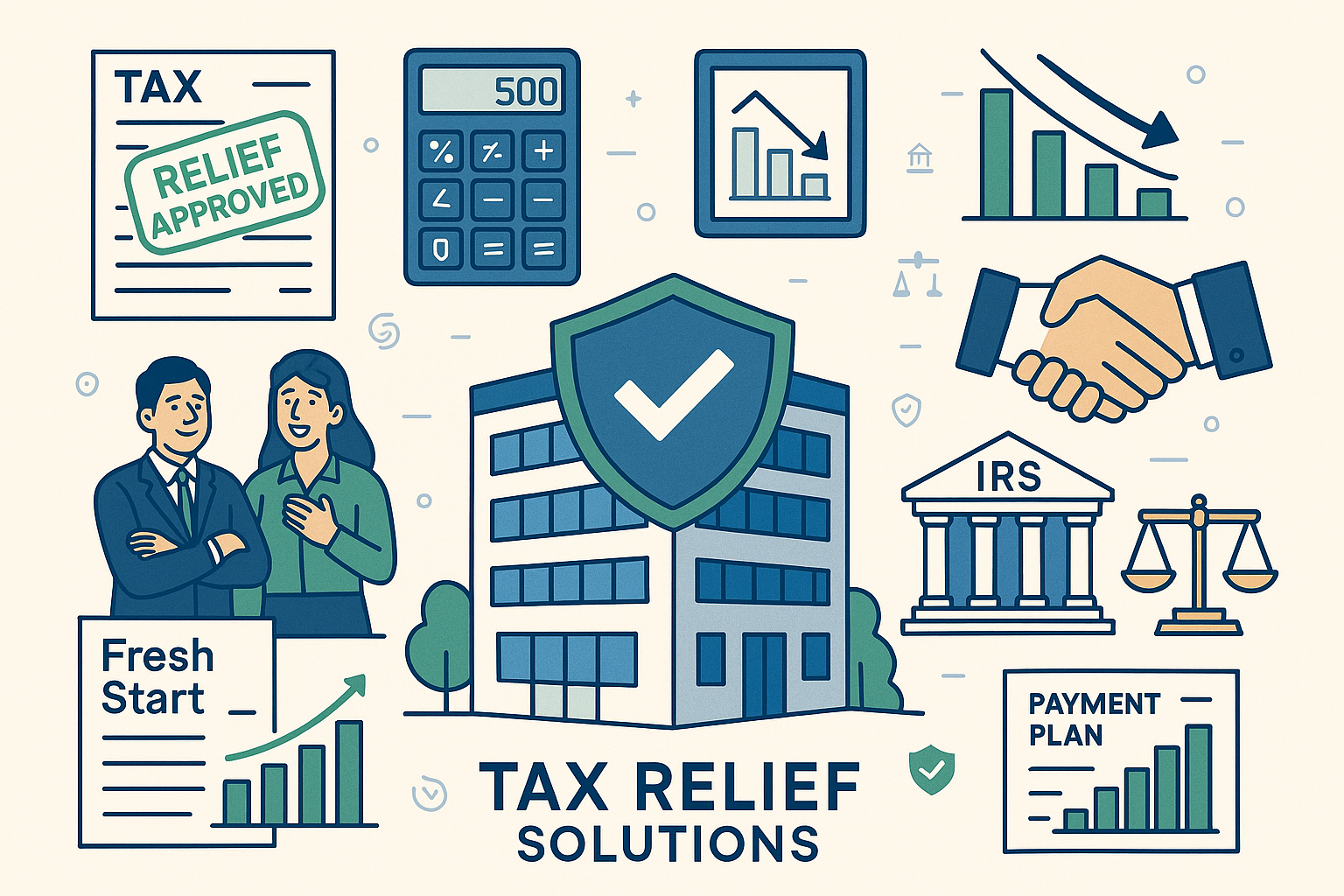



Unexpected penalties and overwhelming tax debt create severe problems for many taxpayers and businesses facing financial obligations. As interest and collection activities continue relentlessly, an escalating tax bill balance can lead to devastating financial hardship, restrict credit availability, and heighten operational stress dramatically. Ignoring these critical issues worsens them because penalties and interest accumulate rapidly over time. Fortunately, the IRS and state agencies provide comprehensive tax relief services to qualified taxpayers who qualify for penalty relief, settle outstanding balances, or meet eligibility requirements for structured payment plan arrangements.
These programs assist individuals and businesses in restoring compliance, preventing interest growth, and regaining complete financial control over their operations. Working with experienced tax relief companies or tax attorneys ensures that you choose the right tax relief program and complete the application process correctly on your behalf. With proper assistance, taxpayers can determine their eligibility, file necessary documentation, and resolve their tax liability systematically. Business tax relief provides a pathway to financial stability and secures a fresh beginning for sustainable operations.
Immediate Penalty Relief Processing: Business taxpayers facing recent penalty assessments can establish immediate penalty relief to prevent escalating tax debt accumulation. These arrangements provide immediate protection from additional penalties while allowing businesses to resolve their tax bill efficiently through proper documentation. The IRS typically processes penalty relief requests within standard timeframes, and taxpayers can file applications electronically through approved systems without extensive requirements beyond demonstrating reasonable cause circumstances.
Structured Payment Plan Agreements: For larger business tax relief needs spanning multiple tax year obligations, comprehensive payment plan arrangements offer systematic resolution over extended periods. These payment agreements require detailed financial condition analysis but provide extensive protection from aggressive collection activities, including asset seizures. Businesses can establish short-term payment plan options or longer-term contracts to ensure consistent compliance and maintain operational stability.
Comprehensive Debt Settlement Programs: Compromise program options offer the most substantial debt relief because compromise lets qualified taxpayers settle obligations for less than the full amount owed. The compromise program process typically qualifies for significant tax debt reduction and resolves outstanding commitments completely. Taxpayers can demonstrate financial hardship through proper documentation, ensuring their compromise application receives serious consideration before final determination.
Streamlined Fresh Start Processing: Modern businesses can establish protection quickly through fresh start program initiatives designed for comprehensive tax relief. The fresh start system allows immediate application process initiation and can provide IRS acknowledgment within reasonable submission timeframes. Taxpayers can manage their tax liability status, track processing progress, or claim additional information through secure systems that streamline entire resolution procedures.
Financial Hardship Standards: To qualify for various tax relief options, businesses must demonstrate legitimate financial hardship while meeting reasonable income and expense verification documentation standards. Lower-income companies may be eligible for simplified relief procedures or extended payment deadline considerations. The IRS evaluates each business's financial condition to determine appropriate relief programs for tax resolution while maintaining operational viability.
Compliance and Documentation Limits: Business taxpayers with various income sources, including tax credits and legitimate business exemptions, can typically qualify for streamlined relief options. Those with complex operational structures may still be eligible but require more extensive financial documentation and supporting records. The IRS evaluates primary income sources and potential tax credits to determine relief eligibility and calculate payment requirements.
Contacting the IRS immediately after receiving notices of collection activities to file tax relief applications is the most effective approach to stopping asset seizures and operational disruptions. Businesses can file relief applications electronically for immediate processing or work with tax attorneys to expedite business tax relief resolution efficiently. Unlike other collection activity responses, establishing an active relief status provides immediate protection and can prevent funds from being seized, preserving access to necessary operational accounts and maintaining business continuity.
Critical Protection Window: Once collection activities start, submitting emergency tax relief applications on time can provide protection and stop aggressive enforcement actions. During this crucial period, businesses can complete comprehensive relief applications and demonstrate their commitment to resolving IRS debt obligations through proper tax relief services. The IRS may suspend collection activities when businesses show good faith through immediate relief application submission and proper financial condition documentation.
Direct Relief Options: Emergencies allow businesses to file comprehensive relief applications and establish ongoing compliance simultaneously. Options include electronic submission of complete forms, comprehensive financial packages, or direct IRS contact to demonstrate immediate compliance commitment. Completing accurate relief applications while providing thorough financial condition analysis shows the IRS that businesses are serious about resolving their tax obligations and can justify halting aggressive collection activities.
Multi-Program Relief Structure: Standard multi-program relief agreements offer extensive protection against collection activities by utilizing systematic tax relief applications that meet IRS compliance requirements. Businesses can establish participation in tax relief programs based on their financial condition documentation, with minimum payment requirements determined by tax liability obligations and available income verification. These agreements resolve penalty accumulation while ensuring proper tax compliance for future tax year obligations.
Professional Service Advantages: Engaging tax relief companies provides additional benefits, including faster processing times and enhanced resolution capabilities. Professional tax relief services ensure accuracy and reduce the risk of processing delays that could affect relief approval timing. The IRS views professional representation favorably and may offer expedited consideration to businesses that complete their tax relief obligations through qualified tax attorneys or enrolled agents.
Business vs. Individual Relief Strategies:
How Relief Agreements Affect Overall Tax Debt Management
A successful application for business tax relief preserves access to essential operational funding while creating a structured tax resolution. Proper relief program participation through qualified applications allows businesses to maintain their financial condition while potentially reducing tax liability through legitimate business exemptions and tax credits. Properly completed relief applications ensure compliance and demonstrate good faith, often leading to favorable IRS consideration and reduced penalty accumulation over time.
Maintaining current tax compliance helps avoid long-term operational damage while rebuilding credit and maintaining business viability. Participating consistently in tax relief programs creates predictable compliance patterns and prevents aggressive collection activities that can damage credit ratings and operational stability. Businesses with a successful relief compliance history may qualify for favorable consideration for payment plan options, further improving their financial condition and relationship with tax authorities.
Suppose your situation is complicated, like having several-year tax obligations, specific business needs, or disagreements about penalties and interest. In that case, you might need help from a professional tax relief company. Tax attorneys understand IRS relief requirements and can negotiate favorable terms, including penalty relief or extended payment deadlines. They can also help coordinate financial documentation with relief applications and ensure optimal debt relief recovery strategies.
The IRS provides comprehensive self-service options for businesses to file relief applications independently. Companies can access required forms through IRS websites, complete their financial documentation to support relief applications, and file supporting materials without professional assistance. The relief system provides structured processing and can establish compliance within standard submission timeframes.
You can immediately file applications for business tax relief without recognizing tax debt obligations or collection activities. Comprehensive relief applications that include complete financial documentation and accurate income reporting are typically processed within the standard IRS timeframes for compliance recognition. Emergency applications can receive expedited consideration, especially when you complete accurate forms and demonstrate genuine financial hardship through comprehensive documentation submission and proper financial condition analysis.
Yes, businesses with ongoing relief applications can request modifications based on changes in their financial condition or operational circumstances. You can adjust relief priorities, provide additional information about income sources, or update financial documentation through direct IRS contact or tax attorneys. Businesses experiencing financial hardship may qualify for revised relief terms or additional consideration while maintaining collection activities protection throughout the modification process.
IRS denial of relief applications doesn't eliminate other resolution opportunities for businesses. However, businesses can often request reconsideration by providing corrected financial documentation, revised income information, or addressing specific concerns through proper appeal procedures. Completing improved applications prevents future complications and maintains opportunities for tax relief. If you foresee any potential denial issues, please contact tax relief companies promptly to address concerns and prevent applications from remaining unresolved.
Approved business tax relief typically restores eligibility for legitimate tax credits and refund opportunities within statutory deadlines. Proper relief participation may qualify businesses for complete tax credit recovery and enhanced benefits beyond basic tax resolution. Joining a relief program usually makes businesses eligible for most tax credits, even though delayed applications may lose some chances. It helps with accurate income reporting for calculating benefits.
Yes, the IRS allows comprehensive relief applications for multiple tax year obligations and various tax types simultaneously. In coordinated relief efforts, business taxpayers can include all outstanding tax liability, including estimated tax payments and property tax considerations. This comprehensive approach safeguards collection activities for all covered obligations and streamlines tax compliance into a systematic relief process that effectively addresses all outstanding business tax requirements.
Tax relief protection for businesses begins immediately upon application approval and continues based on ongoing compliance with relief program requirements. This means maintaining accurate financial reporting, staying current with estimated tax payments, and meeting payment requirements properly. Protection lasts as long as the relief agreements are in effect, offering strong support for business operations and ensuring taxes are paid correctly for the business to stay viable and financially stable.
Methods of Contact
Vital for collaboration, support, or information exchange.